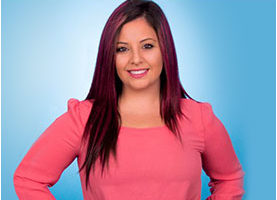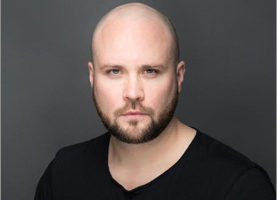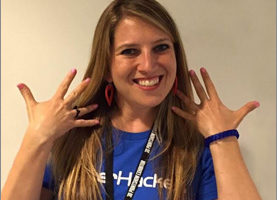In this podcast, Samantha Gladish, holistic wellness coach (holisticwellness.ca) provides detailed, important information about holistic health and holistic wellness.
Gladish suffered through many medical maladies during her early years, from blood sugar level problems, to mood swings, poor digestion and gut health, migraines and day to day headaches, and incredibly painful PMS cramping and bloating. She knew there had to be a better solution so she began a path of discovery in hopes of healing her body. Today, Gladish is healing from her autoimmune Hashimoto’s, and sharing her healing solutions with others.
Gladish talks about her background and her early discovery of nutritious foods, exercise, and healthy ways of living. However, she still suffered from health problems. In her efforts to improve her health, she researched foods, medications, and everything under the sun until she found solutions that worked for her. One potential offender she learned more about through her research was birth control pills. Gladish states that birth control pills pose potential health issues and may present many side effects that are not often discussed with the public. Gladish talks about studies that have linked birth control pills to estrogen dominant cancers. She explains how synthetic hormones work, and how they can fundamentally change the way a woman’s body produces estrogen and progesterone. Gladish talks about select health conditions that could benefit from alternative solutions for healing, and how the medical community sometimes overlooks healthier treatment alternatives. And Gladish discusses vitamins and medications, and root cause medicine.
Richard Jacobs: Hello, this is Richard Jacobs with the future tech and future tech health podcast. I have Samantha Gladish. She’s the author of multiple books. The new one is the 30-day hormone solution. She’s a holistic wellness coach. The website is holisticwellness.ca. So Samantha, thanks for coming. How are you doing?
Samantha Gladish: I’m great. Thanks so much for having me here, Richard.
Richard Jacobs: Yeah, if you would tell me your origin story. I’ve noticed that people in the wellness space always seem to have some great problems that they’ve overcome. Hopefully, that’s not your case, but maybe it’s a good thing regardless because you have overcome it by being here.
Samantha Gladish: Yeah, absolutely. That’s so true. There is a lot of people in the wellness space that have had kind of their own issues with their health and then kind of dive into health and really take their health into their own hands to really overcome it. And that’s sort of part of my story. I really grew up in a household where my mother made everything from scratch and I was always around my mother and my grandmother and they always made everything from scratch and my mother would like cringe at pre-packaged food. And so I was really lucky that I grew up in a household just around really amazing healthy food and food from the garden. And so I was always kind of innately interested in food and wellness and nutrition. I was a really active young girl and just love being outside and really connected to nature and whatnot. But it was really more so in my teens and when I got my cycle and my period, I had a lot of discomfort and cramps and migraines and headaches and a lot of digestive issues that were going on. And so I went on the birth control pill as most young girls do and that seemed to be kind of the solution to all hormonal issues. And it really wasn’t until I got into my early twenties and I started diving into nutrition and I applied to nutrition school. I remember that first week at school I learned all about the birth control pill and how I was taking synthetic hormones and how I was destroying my gut and impairing ovulation and whatnot. And so I ditched the pill and really decided to take my health into my own hands and kind of revamp my diet and my supplement regiment to really support my hormones specifically. And so that’s kind of part of it. And I kind of got into nutrition school mainly because I was just personally interested in and just really wanted to know the information and kind of selfish reasons for myself. In fact, I didn’t even realize at the time like, Oh yeah, I guess I could go on and do this as a career. This is amazing. And then it really wasn’t until later, a couple of years ago in 2017 that I got diagnosed with autoimmune Hashimoto’s and that kind of led onto an even deeper journey of kind of having to level up my health routine and I’m really working to get my Hashimoto’s into remission.
Richard Jacobs: Yeah. Actually, it’s interesting you bring it up. I wouldn’t have thought about this at all a few years ago, but now I think differently, you know, having my own health issues. But can you spend just a couple of minutes talking about the pill? Again years ago I would have thought, not even thought about it just, Oh, he will take the pill and they’ve been on it for years and it’s safe and it’s totally fine. But what with your new knowledge, tell me about the pill and what does it do to women that take it especially long-term?
Samantha Gladish: Yeah, absolutely. So this is a really important question and I work with a lot of women in my practice who have post-birth control pill syndrome, which is actually a real thing. So, I get that the pill, what it really gave women, this sort of liberation over their freedom of their body and sexuality and whatnot. But it also comes with our host of different side effects and issues and which are not often talked about. And I know for myself back at 16, 17, when I initially went on the pill, I was just painted the pack of the pill and my doctor’s office and sent on my way and that was it. I wasn’t told about any warnings or anything like that. And there are actually a ton of studies out there that linked the birth control pill to different sorts of estrogen dominant type cancers. So specifically ovarian cancer or breast cancer all forms of hormonal contraceptives will actually increase your risk of cancer. You’re taking synthetic hormones. So especially what’s really happening is when you are taking these hormones, you are essentially shutting down your ovaries’ capabilities of producing its own hormones. So your ovaries in a sense kind of got lazy and they’re like, well, okay, we’re taking synthetic hormones, I guess we don’t really need to produce our own. And so they really stop working at their optimal functionality. And because you’re taking synthetic hormones and what that does is it really creates this altered state in your body. It shuts down oblation, the oblation is part of your cycle. In fact, obviating is how you produce your estrogen and your progesterone. So oblation is essentially the most important part of our womanhood and regardless whether you want to be pregnant or not, having a healthy cycle and being fertile is really, really important.
So I’m 36 years old. I actually don’t have any intentions to have kids. My partner and I are both on the same page and we don’t want to have children. And so I still want to remain fertile because it means that I have healthy hormones, I have a regular cycle. We want to really remain as fertile as we can for as long as we can, again, regardless of wanting to get pregnant or not. So I think that sometimes when I say fertility, a lot of women instantly think of pregnancy. Of course, I get that, but fertility and remaining for top ones overall. And so the pill really shuts down oblation. It starts to disrupt your microbiome. And we have a lot of incredible microbes that help us produce hormones that help us produce different nutrients and whatnot, like your B12. But the pill really disrupts this delicate balance of good and bad bacteria in the gut. So it really starts to ruin the integrity of the gut and the gut lining. So you’ve got the ovulation issue, you’ve got gut issues, but it also starts to impact your thyroid. It also causes a ton of nutrient deficiencies, so it depletes your body’s ability to produce certain B vitamins. It’s depleting zinc, magnesium, vitamin C, all of these essential nutrients that a woman needs for healthy hormones and for a healthy cycle and for healthy detoxification. It starts to disrupt digestion, liver detox especially your liver is your main detoxifying organ. Every single thing that comes into your body, your liver is working to detox that. And so it can really slow down that detox process, especially synthetic hormones. Your liver works hard to metabolize and detox those hormones. So it’s got to work extra to really get the pill out so to speak. So it causes a lot of issues hormonally speaking and symptomatically, in fact, I have so many women that they come off of the pill and then they develop polycystic ovarian syndrome from using the pill. And they never had that before. And we’re starting to learn that the pill, it plays a role in how our body utilizes insulin. And so we have these women who go on the pill and then they come off and they want to get pregnant and now they’re not having a cycle at all. Their cycles been missing for months and months and then, sure enough, they go to the doctor, do more testing and they have PCLs and more so insulin resistant PCLs. And so yeah, that’s kind of what’s really going on there with the pill and I’m finding it’s becoming this real epidemic and women are just not educated or being educated by their doctors and medical doctors about the detriments that the pill can really cause.
Richard Jacobs: Because unfortunately, people have never seemed to have found a solution that’s as good as nature and people want these solutions. And so what do you suppose to do? Like if you think about the detriments of, for instance, the pill and you want to be sexually active as a woman and you’re like, well, I guess there are other alternatives but they’re not as easy. And I just wonder if people would feel they need this help from the medical system and if they don’t have it, they may feel, you know, what am I supposed to do? Because I guess if you realize that the medical system, unfortunately, is my opinion just doesn’t seem to help in a lot of areas. You can’t, unfortunately. What do you do? Kind of scary.
Samantha Gladish: Absolutely. And I get it like it’s so easy to go and pop this pill every day. I did it myself for almost eight years. And there really are a ton of other solutions, but it really comes down to women having to take that responsibility of truly owning their health and understanding their hormones and really understanding their cycles. So this is a really big part of what I talk about in my book, the 30-day hormone solution and really guiding women through their cycle, the different phases of their cycle and what to look out for and how to kind of track and monitor their cycle. And so I don’t personally love hormonal contraceptives. The other option might be to consider something like the copper IUD. This is non-hormonal. The only thing is some women do experience some issues with the copper IUD and they might have like heavier bleeding or they might have some cramping, whereas other women don’t experience that at all. So it’s worth a try. The thing to keep in mind or two with the copper IUD is that copper can actually deplete your body’s ability to absorb zinc. So if you do that and you would probably have to supplement with a pretty fair dose of zinc so that you can really help to manage those ratios. So the copper IUD, it’s a really good option for sure. But again, it’s not going to be the solution for all women. I personally, I just really track and monitor my cycle so without going into too much detail, but women can definitely go online and, and look up things like natural family planning where you’re basically, you track your temperature, you track your cervical mucus throughout the month, and then you really know the dates that you’re obsoleting and it would be during that window of oblation that you just use protection. You can use something like condoms or you avoid sex altogether, but you kind of know your window oblation. I think there’s also this misconception that a lot of women think that they can get pregnant all of the time. Especially I know myself as a teenager and a younger girl sure, maybe my hormones were a little bit more erotic at that time. Perhaps I could have gotten pregnant at any time. But as we get older it’s so important to really tune in and understand your body because you can’t get pregnant at any time. You only do have this one window of opportunity. So outside of that window you really are safe. So if you can actually understand and really track and monitor your cycle and know when you’re ovulating, then you’re fine. You don’t need to worry about barrier methods and using hormonal contraceptives of any sort.
Richard Jacobs: Yeah. What else I’ve just about to ask you. It also seems like when taking medications that doctor’s just say, here’s a medication, have a nice day. And like for instance, this is a little bit different, but Metformin from what I’ve read depletes B12 and maybe some other B vitamins. And you mentioned that a copper IUD can cause you not to absorb zinc and the pill causes you not to absorb other nutrients. And it just seems like, again, another downside is that probably every medication that people take to plead something else, so they need the supplement and that guidance isn’t given when you’re giving it. So there’s another area yet where you will need to look more deeply.
Samantha Gladish: Absolutely. Our medical system doesn’t practice root cause medicine. Our medical system, don’t get me wrong for real emergencies. It’s so important and we’re lucky to have it, but when we have these issues like high blood pressure or diabetes, especially type two diabetes, it’s a lifestyle disease. I reversed so many type two diabetes in my practice simply by different lifestyle interventions and using specific supplements and herbs as well as getting clients on a really nutrient anti-inflammatory meal plan. I mean, it’s really not difficult. It’s really, really not. And so, we work with so many types two diabetics but you know, really as patients, we need to really take it into our own hands. I think that we often just kind of give away our power thinking that our doctors are all mighty and know all. And again, as I said, they definitely serve a purpose, especially in emergency situations but with a lot of health conditions. There are so many incredible alternatives and I do think that working with the right practitioner who can really dive deeper and understand your health history and understand what you’re eating and what your lifestyle is and what your sleep is like and what your stress is like. All of this plays a role and it’s not something that number one, your doctor is actually educated in or number two doesn’t even have enough time to go through all of that with you. Cause most doctor visits are seven minutes.
Richard Jacobs: Oh, that’s ridiculous. Here doctors aren’t educated in nutrition and they’re not educated in, the effects of the pills they give. So what are they educated in, by the way? I guess just giving pills, cutting you open. Again, it’s my opinion, but what’s the point of their education if it doesn’t really like help people for the most part.
Samantha Gladish: Yeah. And I mean this is definitely, we could totally go down the rabbit hole here, but I do think that there’s a lot of it is so pharmaceutically driven, right. And so it’s something we, again, as patients need to be really conscious of because it’s pretty scary how many clients I do work with that are coming into my clinic and my virtual online clinic and on seven or eight different medications with a ton of different side effects. And they’re not helping, they’re just not helping and diet and supplements and lifestyle and sleep and stress just has not even been addressed with them.
Richard Jacobs: I haven’t thought of this before being a guy, but the woman’s microbiome, especially I guess as she cycles that changes every month. And I’m sure the microbiome dramatically changes over the month. And I just wonder what goes on and I don’t even know if it’s been studied barely at all. I mean, we hear about the gut microbiome, but I have no clue what’s going on with a woman’s microbiome. I wonder if there’s been studies on it.
Samantha Gladish: Yeah, actually, that’s a really great question. I’m not familiar of any study specifically with that, but what we need to keep in mind too, is specifically with childbirth, right? For women, when you are having natural birth and you have a child pass through the birth canal they’re picking up all of that really important bacteria, which is what builds their gut and builds their immune system. So pharmaceuticals are going to impact your microbiome, your diet and sugar and gluten. These things will impact your microbiome. Stress will impact your microbiome. So all of these things play a role. I mean not just women. We want everybody to have a healthy microbiome and real like important gut integrity there. It plays a real role, especially with autoimmune and what not. So it’s so important, especially for women who are thinking about conceiving to really optimize their diet and really support their health in a really big way so that they can have a healthy pregnancy and healthy children.
Richard Jacobs: Well, it also makes me think when a lot of pills went through their clinical trials or developed, I don’t know, I haven’t ever even heard or thought to look, you know, were women tested or just men? And in what stage of the cycle were the women, were they in menopause, without the menopause. Again, when they are obviating when they not, so now I wonder, women have to probably a lot more aware of any pills they take any medications because depending on what part of their cycle they’re in, it could probably dramatically affect them. Same medication, same person.
Samantha Gladish: Yeah, absolutely. Absolutely. Definitely something to look in deeper and something I haven’t truly explored in terms of medication use or dosage in women cycle.
Richard Jacobs: So you’ve worked with a lot of people over a long time. What are some of the insights you’ve gotten that just really surprised you about how people react to medications.
Samantha Gladish: Yeah, absolutely. I mean, in my practice and times this can be the case is that I’m sort of the last resort and I am sure that a lot of different natural paths are nutritionist and functional medical doctors sort of feel the same way as we have these patients or these clients that have gone the medical route and many years later are still not getting better. And so they kind of hit this rock bottom. And we ended up becoming this last resort where they come to seek us and get our support and our guidance to really bring about healing. And so I feel at that point many of my clients are, I would say all of my clients are 1000% open to whatever protocol it is I’m introducing for them. Now might there be some hesitancy about taking someone’s cough, helping them reduce their sugar or take Luke note. Yes, absolutely. I would say that there tends to be more hesitation around diets, diet preferences, then there is taking a supplement. So I do feel that once clients come to me, they’re really at a point where they’re just, they’ve really hit the rock bottom, their symptoms, their pain, whatever it is they may be experiencing has is really at a point where it’s taking over their quality of life. And so they are really willing to do anything to make a difference. And so their compliance is pretty great at that point.
Richard Jacobs: There are a lot of outliers that you just haven’t been able to help or have you pretty much been able to help everybody? I know everyone’s different, but in general, does it take months for someone to really help themselves or can they get it be accomplished in weeks?
Samantha Gladish: Yeah, I mean it really depends. Within my scope of practice, I specialize really in weight loss and women’s hormonal health. So if anybody is coming to me with issues outside of that, then I’m definitely going to refer them out. And I really only want to work with those whom I know I can support and I’m not here to say that I can kind of do it all. So I really want to help give people really connect them with the people who are really going to be the best fit for them. So within the weight loss and hormone scope, that is really where my expertise lies. And so I’ve got over 500 weight loss transformation. So that’s definitely a big expertise of mine. And really from dietary perspective and really helping to support client’s diets and what they’re eating. At the end of the day, I always say I help women lose weight and support their hormones by eating delicious food. And I think there’s a really big misconception there that when it comes to hormonal health and when it comes to weight loss, you have to eat food that’s really bland and boring. And that’s really not the case. So within the women that I’ve worked with whether that’s PCOS or type two diabetes or menopause or weight loss in any kind of weight loss resistance that’s going on, I’m helping women with their cycle and fertility. That’s really the scope that I work with and we have a really, really high success rate. And at the end of the day it also comes down to our clients having to really take responsibility and having to take action and really implement what it is that we are proposing. And it’s nothing drastic. It’s nothing crazy. We coach and support our clients through our programs. And so there’s a lot of support and there’s a whole lot of love and there’s a whole lot of accountability. But each person is so unique and so individual. So it really just depends what kind of approach we’re going to take. But we definitely have a really high success rate. And for anybody that’s listening who feels like they are struggling cause or PMs or fertility or PCOS or weight loss, I really want them to know that there is another way and it doesn’t have to be challenging. It doesn’t have to be difficult and there really is a way to find your way back to yourself and truly thrive.
Richard Jacobs: Where can clients work with you? You do it over the internet or they have to be local? What are your areas?
Samantha Gladish: I’m online so pretty much globally I’ve got clients all over which is really, really wonderful and they can connect with myself and my team at holisticwellness.ca. We have a lot of different programs available. We have some online group coaching programs and then we also have some more inclusive programs for those who want to coach with us one-on-one. There is myself as well as my other coach where we work with clients and yes. So online, which is wonderful because I can reach people globally.
Richard Jacobs: And should they read your recent book before they see you or should they maybe do an initial consult first and read it? What’s your suggestion there?
Samantha Gladish: Yeah, I mean that really doesn’t matter. That’s up to the person. The 30-day hormones solution is available for preorder. So just really, really exciting. I just got my hands on the advanced copy and they can dive into that at any point. That really is a book that was written for, I thought to myself, if I only had 30 days to spend with somebody, what is it that I would really teach them? Like if I have this woman in front of me for 30 days, what can I teach her about her body and her hormones, better health about life, about food and nutrition. I put it all into that book. And so it’s got some amazing gluten-free grain-free recipes. There’s 60 amazing recipes in there that I really do hope will become family favorites. And the first half of the book really dives into women’s cycles as well as the adrenal health and thyroid health and blood sugar and detox and sleep with some really amazing protocols in there. So it’s definitely a great place to start if you are kind of just dipping your foot into the natural health world then it’s definitely a great place to start and will help really build that foundation for you.
Richard Jacobs: Okay. And what’s the date of the formal release of your book?
Samantha Gladish: It will be available December 17th, 2019 of this year.
Richard Jacobs: Okay. And then probably will be Barnes and Noble, Amazon, et cetera.
Samantha Gladish: Oh yes, absolutely. Yes. So it’s available for preorder right now and if anyone’s interested, they can head on over to hormone solution, book.com for 350 amazing, free preorder bonuses for anybody that wants to preorder the book. And the bonuses are really amazing. So we dive into an autoimmune healing meal plan and we’ve got a gut-healing guide as well as an essential hormone labs for women that they can speak to their doctor about. So that’s some really amazing bonuses over there for anybody that wants to preorder.
Richard Jacobs: All right, well that’s great. Well Samantha I appreciate you coming on. And I know there’s probably 10,000 more questions than before we started, but at least asking these questions is better than just assuming they don’t apply and dealing with health care as it currently is that any of these, so I appreciate you.
Samantha Gladish: Yes. Thank you so much for having me here.
Podcast: Play in new window | Download | Embed











